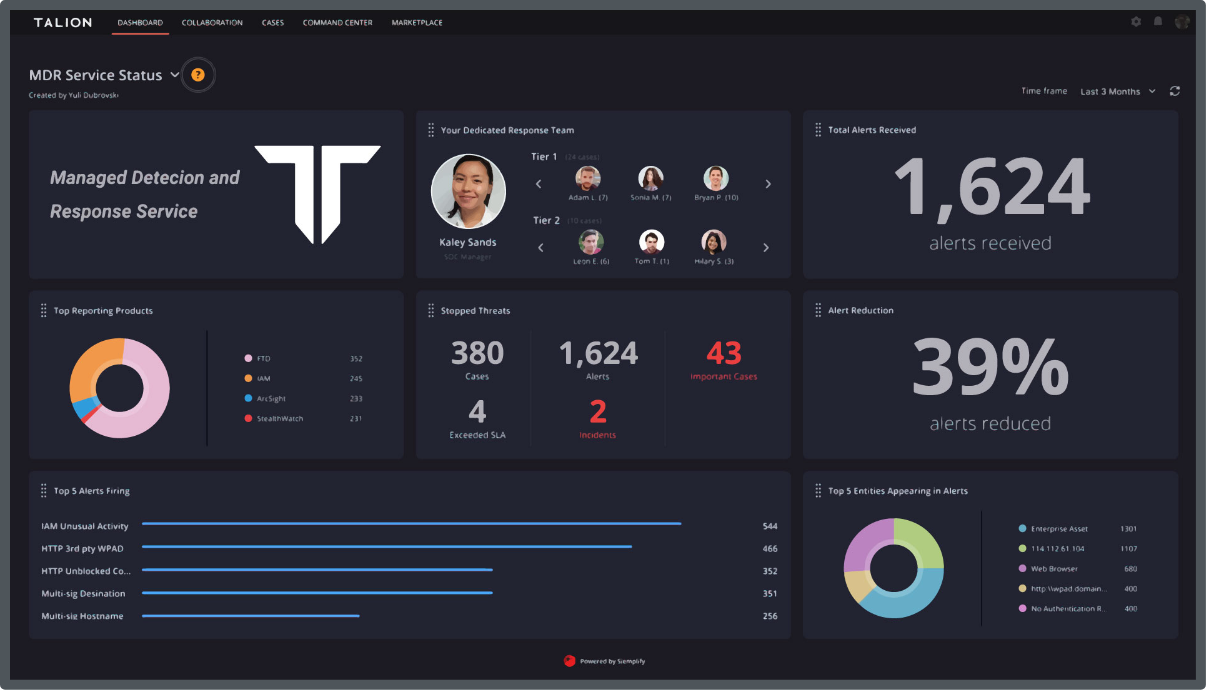When it comes to cybersecurity, artificial intelligence (AI) has emerged as a double-edged sword, offering both groundbreaking solutions and unprecedented challenges. In the US alone, 73% of companies have implemented AI to some extent, with 54% adopting generative AI. As AI adoption rapidly grows, so do opportunities for hackers to exploit more vulnerabilities, creating more work for CISOs and SOC Managers to monitor and mitigate risks.
On the other hand, there are also ways that AI is being used to help SOC teams with threat detection and response, security task automation and more. Because AI presents opportunities for SOC teams and cyber gangs, it’s important to understand the growing list of pros and cons for AI in cybersecurity.
AI’s ability to analyze vast datasets swiftly enables the detection of anomalies that could indicate potential threats, often identifying malicious activities before they escalate. For instance, in 2021, a major financial institution in the U.S. employed AI-driven security systems, which identified and thwarted a sophisticated spear-phishing attack targeting its high-profile clients, preventing millions in potential losses.
Tip: Invest in AI-driven threat detection tools that integrate seamlessly with your existing security infrastructure, ensuring they’re configured to your organization’s unique digital environment.
AI excels in automating routine security tasks such as patch management and log analysis, freeing up valuable human resources for more complex problem-solving activities. A case in point is a UK-based e-commerce giant that leveraged AI to automate its vulnerability assessment processes, reducing the time to patch critical vulnerabilities by 40%.
Tip: Identify repetitive tasks within your security operations that are prime candidates for automation, and pilot AI tools to measure efficiency gains.
AI’s predictive capabilities enable organizations to foresee and mitigate potential threats before they materialize. For example, a U.S. healthcare provider implemented AI-powered predictive analytics to successfully anticipate and counter a wave of ransomware attacks targeting the healthcare sector, significantly minimizing potential disruptions.
Tip: Collaborate with AI solution providers to tailor predictive analytics models that align with your industry’s threat landscape and risk profile.
Adversaries are increasingly harnessing AI to develop more sophisticated attack methods, such as polymorphic malware that evades traditional detection mechanisms. A notable incident involved a UK financial services firm that fell victim to an AI-generated phishing campaign that was so sophisticated it was able to bypass its security filters.
Tip: Regularly update your AI-driven security systems and conduct red team exercises to simulate AI-powered attacks, ensuring your defenses remain robust.
The deployment of AI in cybersecurity raises significant ethical and privacy issues, particularly around data handling and surveillance. A controversial case arose when a U.S. tech company’s AI-powered employee monitoring tool was deemed invasive, sparking widespread privacy concerns and legal scrutiny.
Tip: Ensure that your use of AI in cybersecurity aligns with regulatory requirements and ethical standards for transparency and accountability.
An over-reliance on AI can lead to complacency and a false sense of security, undermining the effectiveness of cybersecurity defenses. A sobering example is a U.S. retailer that over-trusted its AI-based security system, overlooking crucial manual checks, which led to a significant data breach.
Tip: Maintain a balanced approach to cybersecurity, where AI complements but does not replace human expertise and intuition.
As a testament to AI’s prowess in cybersecurity, a series of coordinated DDoS attacks targeted government websites in both the U.S. and UK. Leveraging AI’s real-time analysis capabilities, cybersecurity teams were able to quickly identify and mitigate the attacks, tracing their origins and implementing countermeasures to prevent future incidents. This case underscores AI’s critical role in modern cybersecurity arsenals with its potential to safeguard national infrastructure against sophisticated threats.
As AI continues to redefine the cybersecurity landscape, CISOs must navigate its complexities with a strategic and balanced approach. By leveraging AI’s strengths and mitigating its drawbacks, organizations can enhance their cybersecurity posture while fostering innovation and resilience. Embracing AI in cybersecurity is not just about adopting new technologies; it’s about adapting to a new paradigm where human expertise and artificial intelligence converge to combat an ever-evolving threat landscape.
To make sure your cybersecurity program is leveraging the best of both, book a free consultation.

Call us directly and we’ll put you in touch with the most relevant cyber expert.
Not currently free to call? Give us a brief description of what you’re looking for by filling out our form and we’ll email you as soon as we can.
